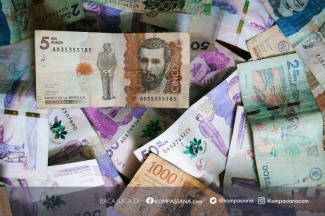The Eurozone economy has shown an improvement growth in the past ten years. Having a negative economy growth due to financial crisis in 2009, the average GDP growth of Eurozone gradually increased. In the 2017Q1, the economic growth increased by 0.1% compared to the end of 2016. An improvement of the Eurozone economy has led to a stronger exchange rate of Euro against other currencies.
The stronger currency may have a good impact because it may prevent the Eurozone economy from the imported inflation, the rise of the domestic goods price because of the increase of the imported input of domestic industries. However, it also may have a negative impact for the export goods and services produced by the Eurozone economy.
The Euro has been strengthening against the top 10 export destination countries. United States (US) was at the first place of export destination countries for goods and services produced by the Eurozone economy. It has an export share about 20.7% of all the Eurozone's export. Since the first quarter 2017, the US dollar has been gradually weakening against the Euro.
It has reached EUR/USD 1.20 on September 10, 2017, the weakest exchange rate in the past one year. The People Republic of China (PRC) was at the second place of the Eurozone export destination countries. The share of Eurozone export to this country was 9.7%. The Euro also has been increasing gradually since the first quarter of 2017. The exchange rate of EUR/CNY was 7.78 on the last trade.
The strengthening Euro against other currencies may threat the export products and services produced by the Eurozone industries. Technically, the stronger Euro may lead to more expensive Eurozone products and services. It will reduce the purchasing power of customers for the Eurozone's products and services. As a result, it will decrease the demand of Eurozone's products and services which can be said the lower of Eurozone's GDP growth in the next periods. Should the Euro be intervened to keep the comparative advantage of Eurozone industries?
In the short term, the answer is yes. In the middle of the global economic growth slowdown, the Eurozone has to maintain its competitiveness in the international market. Maintaining the Euro's exchange rate at the comfortable level for the customers is one of the solutions to maintain the competitiveness. If it is needed, the European Central Bank (ECB) has to intervene the exchange rate. However, the low exchange rate is not a long term solution to maintain the competitiveness. Krugman (1994) has warned the dangerous of the obsession to maintain the competitiveness of a country because it may lead to misleading public policy, protectionism, and trade wars. Nevertheless, competitiveness remains important for the country because one country can learn from other countries that have had a successful international trade to improve its performance (Dunning, 1995).
The long term strategy to maintain its competitiveness is to improve its efficiency in producing goods and services. The efficiency can reduce the variable costs to produce goods and services. The decline of variable costs may increase the profits or decreasing price of goods and services without decreasing the profits. It leads to more competitive industry in the global market. Improving the efficiency is not a easy and simple. It may spend years to find the solution to improve its efficiency. Thus, it is the long term strategy. The Eurozone industry can learn from other countries that are more efficiency in producing goods and services.
References
Dunning, J. H. (1995), "Think again Professor Krugman: Competitiveness does matter". The International Executive, 37: 315--324
Paul Krugman (1994), "Competitiveness: A Dangerous Obsession", Foreign Affairs 73 (March/April), pp. 28-44
Baca konten-konten menarik Kompasiana langsung dari smartphone kamu. Follow channel WhatsApp Kompasiana sekarang di sini: https://whatsapp.com/channel/0029VaYjYaL4Spk7WflFYJ2H
